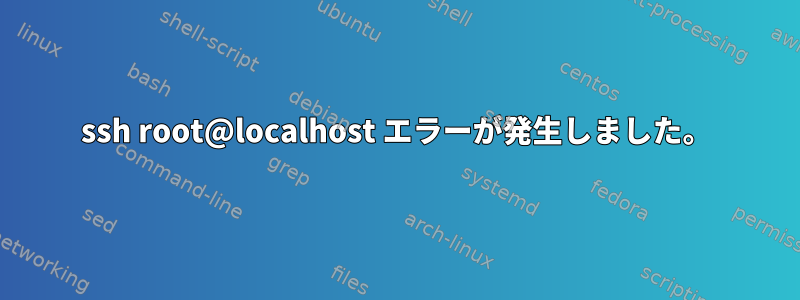
セキュリティレベルを取得するには、Linux仮想マシンからルートシェルをインポートする必要があります。システムにユーザーアカウントがあり、すべてのファイル(例:/ etc ...)に書き込む方法があります。
ssh root@localhost
ssh-keygenを使用してrsaキーを作成し、それを/root/.ssh/authorized_keysに追加し、ルート接続を許可するように/etc/ssh/sshd_configを変更しました。ただし、rootとしてボックスに接続することはできません。出力は次のとおりです。
Last login: Fri Jan 27 00:43:01 2012 from localhost
Connection to localhost closed.
認証は成功しましたが、接続がすぐに終了するようです。なぜこれがうまくいかないのかわかりません。
詳細な出力は次のとおりです。
OpenSSH_4.6p1 Debian-7, OpenSSL 0.9.8g 19 Oct 2007
debug1: Reading configuration data /etc/ssh/ssh_config
debug1: Applying options for *
debug1: Connecting to localhost [127.0.0.1] port 22.
debug1: Connection established.
debug1: identity file /home/user/.ssh/identity type -1
debug1: identity file /home/user/.ssh/id_rsa type 1
debug1: identity file /home/user/.ssh/id_dsa type -1
debug1: Remote protocol version 2.0, remote software version OpenSSH_4.6p1 Debian-7
debug1: match: OpenSSH_4.6p1 Debian-7 pat OpenSSH*
debug1: Enabling compatibility mode for protocol 2.0
debug1: Local version string SSH-2.0-OpenSSH_4.6p1 Debian-7
debug1: SSH2_MSG_KEXINIT sent
debug1: SSH2_MSG_KEXINIT received
debug1: kex: server->client aes128-cbc hmac-md5 none
debug1: kex: client->server aes128-cbc hmac-md5 none
debug1: SSH2_MSG_KEX_DH_GEX_REQUEST(1024<1024<8192) sent
debug1: expecting SSH2_MSG_KEX_DH_GEX_GROUP
debug1: SSH2_MSG_KEX_DH_GEX_INIT sent
debug1: expecting SSH2_MSG_KEX_DH_GEX_REPLY
debug1: Host 'localhost' is known and matches the RSA host key.
debug1: Found key in /etc/ssh/ssh_known_hosts:2
debug1: ssh_rsa_verify: signature correct
debug1: SSH2_MSG_NEWKEYS sent
debug1: expecting SSH2_MSG_NEWKEYS
debug1: SSH2_MSG_NEWKEYS received
debug1: SSH2_MSG_SERVICE_REQUEST sent
debug1: SSH2_MSG_SERVICE_ACCEPT received
debug1: Authentications that can continue: publickey,password,hostbased
debug1: Next authentication method: publickey
debug1: Trying private key: /home/user/.ssh/identity
debug1: Offering public key: /home/user/.ssh/id_rsa
debug1: Server accepts key: pkalg ssh-rsa blen 277
debug1: read PEM private key done: type RSA
debug1: Authentication succeeded (publickey).
debug1: channel 0: new [client-session]
debug1: Entering interactive session.
debug1: Sending environment.
debug1: Sending command: /bin/bash
debug1: client_input_channel_req: channel 0 rtype exit-status reply 0
debug1: channel 0: free: client-session, nchannels 1
debug1: Transferred: stdin 0, stdout 0, stderr 0 bytes in 0.0 seconds
debug1: Bytes per second: stdin 0.0, stdout 0.0, stderr 0.0
debug1: Exit status 255
答え1
SSHログインは主に3つの段階に分けられます。
- SSHは、要求されたユーザーがパスワード、秘密鍵、またはその他の方法を持っていることを確認してユーザーを認証します。
- SSHはPAMを通過できるセッションを開始します(したがってPAM構成によっては失敗する可能性があります)。
- SSHはシェルを起動します。
トレースのこの部分ではssh -v:
debug1: Authentication succeeded (publickey).
debug1: channel 0: new [client-session]
debug1: Entering interactive session.
debug1: Sending environment.
debug1: Sending command: /bin/bash
SSHレベルの認証が成功し、sshデーモンがシェル(/bin/bash)を起動していることがわかります。したがって、/bin/bashその中にあるものやその構成がログインを妨げているのです。 Bash初期化ファイル~root/.bash_loginと、~root/.bash_profileここ/etc/profileに含まれる可能性がある他のファイルを確認してください。非対話型ログインを試みますssh root@localhost ls。これはまだbashを渡しますが、同じinitファイルは渡しません(bashは~/.bashrc親がある場合、または非対話型ログインを読むという点で奇妙です)。rshdsshd
initファイルに破損した部分がある場合は、適切な時間にCtrl+を押すと中断できますC(SSHセッションを確立した後、SSHがリモートホストにCtrl+を送信し、C接続を閉じずに問題が発生する前)。初期化ファイルの指示)。実際には、数回の試みで正確な時間を手動で取得することができ、これはシステムをロードするのに役立ちます。手動で行うことができない場合は、小さなexpectプログラムが役立ちます。
答え2
Gillesが言及したことに加えて、ルートのシェルを/etc/passwd。/bin/bash/bin/falseid root
答え3
私の推測では、のデフォルトパスが/etc/passwd存在しないか、間違った所有権/権限があるようです。


